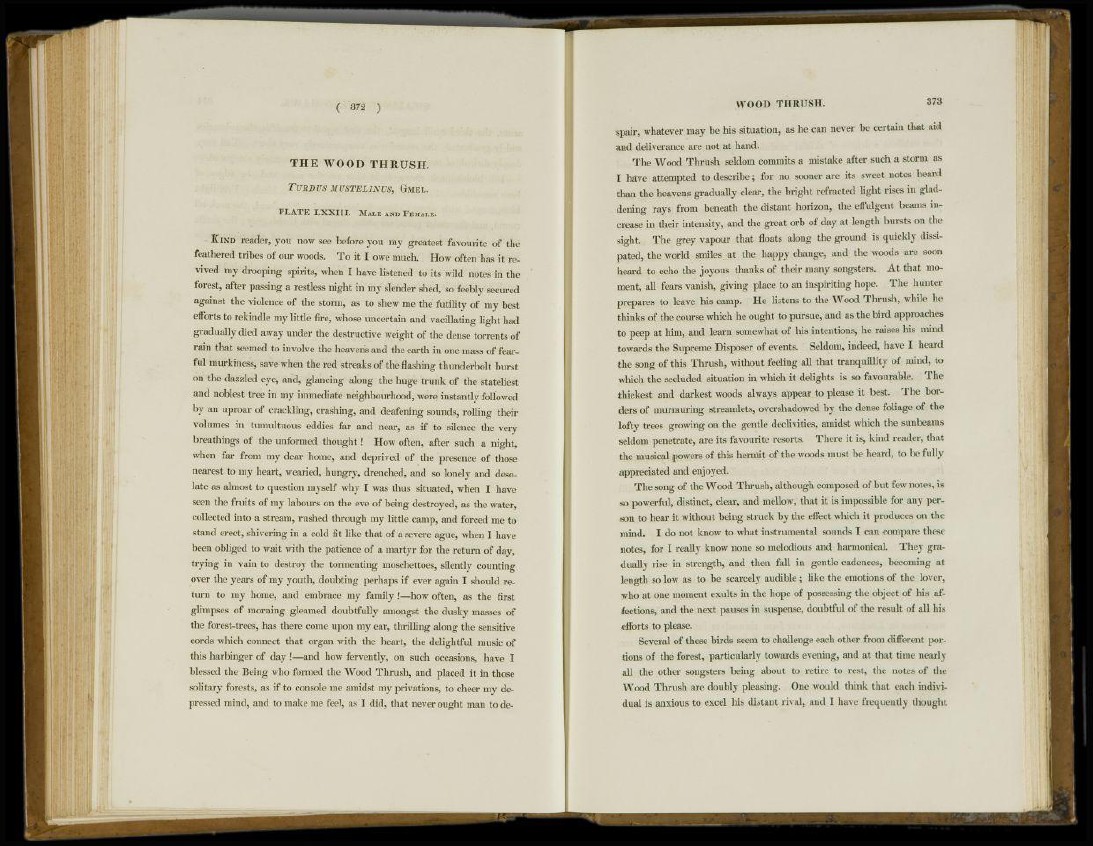
( 372 )
THE WOOD THRUSH.
TURDUS MUSTELINUS, GMEL.
P L A T E L X X I I I . MALE AND FEMALE.
K I N D reader, you now see before you my greatest favourite of the
feathered tribes of our woods. To it I owe much. How often has it revived
my drooping spirits, when I have listened to its wild notes in the
forest, after passing a restless night in my slender shed, so feebly secured
against the violence of the storm, as to shew me the futility of my best
efforts to rekindle my little fire, whose uncertain and vacillating light had
gradually died away under the destructive weight of the dense torrents of
rain that seemed to involve the heavens and the earth in one mass of fearful
murkincss, save when the red streaks of the flashing thunderbolt burst
on the dazzled eye, and, glancing along the huge trunk of the stateliest
and noblest tree in my immediate neighbourhood, were instantly followed
by an uproar of crackling, crashing, and deafening sounds, rolling their
volumes in tumultuous eddies far and near, as if to silence the very
breathings of the unformed thought! How often, after such a night,
when far from my dear home, and deprived of the presence of those
nearest to my heart, wearied, hungry, drenched, and so lonely and desolate
as almost to question myself why I was thus situated, when I have
seen the fruits of my labours on the eve of being destroyed, as the water,
collected into a stream, rushed through my little camp, and forced me to
stand erect, shivering in a cold fit like that of a severe ague, when I have
been obliged to wait with the patience of a martyr for the return of day,
trying in vain to destroy the tormenting moschettoes, silently counting
over the years of my youth, doubting perhaps if ever again I should return
to my home, and embrace my family !—how often, as the first
glimpses of morning gleamed doubtfully amongst the dusky masses of
the forest-trees, has there come upon my ear, thrilling along the sensitive
cords which connect that organ with the heart, the delightful music of
this harbinger of day !—and how fervently, on such occasions, have I
blessed the Being who formed the Wood Thrush, and placed it in those
solitary forests, as if to console me amidst my privations, to cheer my depressed
mind, and to make me feel, as I did, that never ought man tode-
WOOD THRUSH. 373
spair, whatever may be his situation, as he can never be certain that aid
and deliverance are not at hand.
The Wood Thrush seldom commits a mistake after such a storm as
I have attempted to describe; for no sooner are its sweet notes heard
than the heavens gradually clear, the bright refracted light rises in gladdening
rays from beneath the distant horizon, the effulgent beams increase
in their intensity, and the great orb of day at length bursts on the
sight. The grey vapour that floats along the ground is quickly dissipated,
the world smiles at the happy change, and the woods are soon
heard to echo the joyous thanks of their many songsters. At that moment,
all fears vanish, giving place to an inspiriting hope. The hunter
prepares to leave his camp. He listens to the Wood Thrush, while he
thinks of the course which he ought to pursue, and as the bird approaches
to peep at him, and learn somewhat of his intentions, he raises his mind
towards the Supreme Disposer of events. Seldom, indeed, have I heard
the song of this Thrush, without feeling all that tranquillity of mind, to
which the secluded situation in which it delights is so favourable. The
thickest and darkest woods always appear to please it best. The borders
of murmuring streamlets, overshadowed by the dense foliage of the
lofty trees growing on the gentle declivities, amidst which the sunbeams
seldom penetrate, are its favourite resorts. There it is, kind reader, that
the musical powers of this hermit of the woods must be heard, to be fully
appreciated and enjoyed.
The song of the Wood Thrush, although composed of but few notes, is
so powerful, distinct, clear, and mellow, that it is impossible for any person
to hear it without being struck by the effect which it produces on the
mind. I do not know to what instrumental sounds I can compare these
notes, for I really know none so melodious and harmonical. They gradually
rise in strength, and then fall in gentle cadences, becoming at
length so low as to be scarcely audible; like the emotions of the lover,
who at one moment exults in the hope of possessing the object of his affections,
and the next pauses in suspense, doubtful of the result of all his
efforts to please.
Several of these birds seem to challenge each other from different portions
of the forest, particularly towards evening, and at that time nearly
all the other songsters being about to retire to rest, the notes of the
Wrood Thrush are doubly pleasing. One would think that each individual
is anxious to excel his distant rival, and I have frequently thought